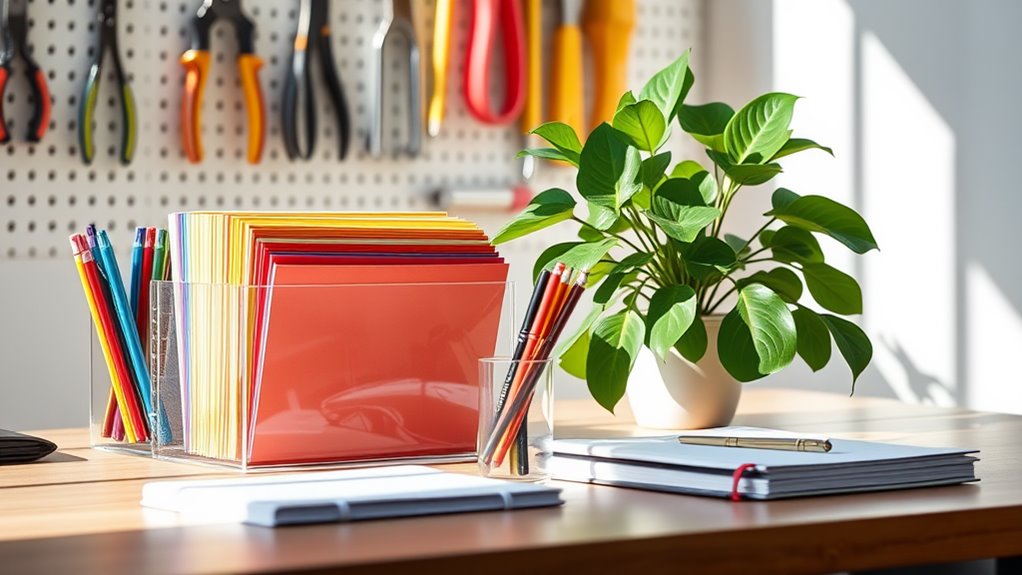Organization Tips That Are Surprisingly Simple and Effective
If you’re looking for surprisingly simple organization tips, start by decluttering one drawer at a time. Empty it out and assess each item for usefulness. Use the Two-Minute Rule to tackle quick tasks immediately, like responding to emails. Invest in clear storage bins; label and group similar items for easy access. Create a weekly time block for your tasks, ensuring you prioritize effectively. Finally, consider a “No Buy” month to control clutter and spending. These tips can really streamline your space and boost productivity. There’s even more to discover about enhancing your organization skills effectively.
Key Takeaways
- Focus on one drawer at a time to make decluttering manageable and less overwhelming.
- Apply the two-minute rule to complete small tasks immediately, reducing procrastination.
- Utilize clear storage bins, label them, and group similar items for easy access and visibility.
- Implement weekly time blocking to allocate specific slots for tasks, enhancing productivity and reducing burnout.
- Consider a “No Buy” month to promote mindful spending and prevent clutter from accumulating in your home.
Declutter One Drawer at a Time
When tackling clutter, start with just one drawer at a time to keep things manageable. Open that drawer and take everything out.
Lay the items on a flat surface, so you can see what you’ve got. As you sort through, ask yourself if each item is useful or necessary. If it’s not, consider tossing or donating it.
Group similar items together to create a sense of order. You’ll find that organizing becomes easier when you focus on small areas.
Once you finish, wipe down the drawer, and return only the items you decided to keep. You’ll feel accomplished, and this method makes the overall decluttering process less overwhelming.
Celebrate your progress, and then tackle the next drawer!
The Two-Minute Rule
If you find yourself procrastinating on small tasks, the Two-Minute Rule can be a game changer. This simple strategy suggests that if a task takes two minutes or less, you should do it immediately instead of putting it off.
By tackling quick tasks right away, you’ll not only clear your to-do list faster but also boost your motivation. Whether it’s responding to an email, organizing your desk, or putting away dishes, these small actions add up.
You’ll feel a sense of accomplishment, which makes bigger tasks seem less intimidating. Embrace the Two-Minute Rule, and watch your productivity soar as you transform chaos into order, one small task at a time.
It really simplifies your daily routine!
Use Clear Storage Bins
Tackling small tasks can create a solid foundation for greater organization, and using clear storage bins takes that to the next level.
These bins not only keep your space tidy, but they also help you see what’s inside at a glance.
Here are four ways to make the most of clear storage bins:
- Label Everything: Use stickers or labels to identify contents easily.
- Sort by Category: Group similar items together, like office supplies or seasonal decorations.
- Stack for Space: Maximize vertical space by stacking bins securely.
- Use Various Sizes: Choose different sizes to accommodate items of all shapes.
With these tips, you’ll boost your organization game and simplify your life!
Create a Weekly Time Block
Creating a weekly time block can revolutionize how you manage your tasks and commitments. By dedicating specific time slots for various activities, you’ll gain clarity and focus.
Start by listing your priorities for the week, then allocate time blocks for each task. For instance, set aside mornings for deep work and afternoons for meetings or emails.
Be sure to include breaks to recharge. Use a planner or digital calendar to keep track of your blocks, ensuring you stick to the schedule.
This structured approach not only boosts productivity but also helps prevent burnout. As you refine your blocks each week, you’ll find what works best for you, making it easier to adapt and stay organized in your daily life.
Establish a “No Buy” Month
After mastering your weekly time blocks, consider establishing a “No Buy” month to further enhance your organizational skills.
This simple challenge can help you save money, declutter, and focus on what you truly need. Here are four benefits you’ll experience:
-
Increased Savings: By avoiding unnecessary purchases, you’ll notice a significant boost in your bank account.
-
Mindful Spending: You’ll become more aware of your spending habits and learn to differentiate between needs and wants.
-
Decluttered Space: Without new items entering your home, you’ll naturally reduce clutter and create a more organized environment.
-
Creative Solutions: You’ll find alternative ways to enjoy activities and fill your time, sparking creativity in your daily life.
Embrace the challenge and watch your organization skills soar!
Frequently Asked Questions
How Do I Maintain Organization After Decluttering?
To maintain organization after decluttering, create a daily routine for tidying up. Set aside a few minutes each day to put things back in their designated places, and regularly reassess your belongings to stay clutter-free.
What Items Should I Prioritize for the Two-Minute Rule?
You should prioritize small tasks that can be completed quickly, like sorting mail, putting away items, or responding to a brief message. These quick wins reduce clutter and boost your motivation to tackle larger tasks.
Where Can I Find Affordable Clear Storage Bins?
You can find affordable clear storage bins at local discount stores, big-box retailers, or online marketplaces. Don’t forget to check thrift shops and clearance sections for great deals on gently used options too!
How Do I Stick to a Weekly Time Block?
To stick to a weekly time block, set specific goals for each block. Use reminders and stay disciplined. If something disrupts your schedule, adapt and adjust rather than abandon your plan entirely. You’ve got this!
What Challenges Might I Face During a “No Buy” Month?
During a “no buy” month, you might struggle with cravings for new items, social pressures to spend, and the temptation to justify purchases. Staying focused on your goals is essential to overcome these challenges.



